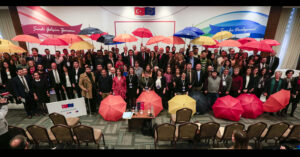
Technical Assistance for Implementation of Civil Society Dialogue and Civil Society Support Programmes (TR2015/DG/01/A5-01/001)
The overall aim of the project is to increase bilateral exchanges and cooperation between CSOs in Turkey and the EU at local, regional and national levels, to promote awareness raising initiatives on importance and benefits of membership of Turkey to the EU within Turkey and EU and on

Technical Assistance for Facilitating Access of Disadvantaged Higher Education Students to the Labour Market
Research indicated that disadvantaged people, especially poor students, lack in participation in the labour market. Consequently, the purpose of the project was to increase the employability of disadvantaged people, facilitate their access to the labour market, and increase their access to public employment services. Helping disadvantaged people gain

Technical Assistance for Promoting Registered Employment
Unregistered employment remains one of the critical concerns and significant challenges of the Turkish labour market. Even though recent years have seen a downward trend in unregistered employment, a substantial portion of Turkey’s workforce is still employed without being registered with the social security system. In this regard,

Technical Assistance to Implementation of Civil Society Support Programme
The overall objective of the project is to support the development of civil society through more active democratic participation in policy and decision making processes and by promoting a culture of fundamental rights and dialogue.

Technical Assistance for Result Oriented Monitoring in Turkey-Phase III
Within the scope of this project, we are aiming to ensure efficient and effective of IPA II assistance with a view to better achievement of the objectives set out in the Indicative Strategy Paper of Turkey (2014-2020) and assist NIPAC to fulfil his extended monitoring responsibility.

Technical Assistance for Promoting Women’s Employment in Turkey
The employability of women has been a challenging issue in Turkey for decades. The labour market of women needs to be improved in terms of the existing capacity to design, develop and implement policies to attract and retain more people in employment, particularly by increasing the participation of

